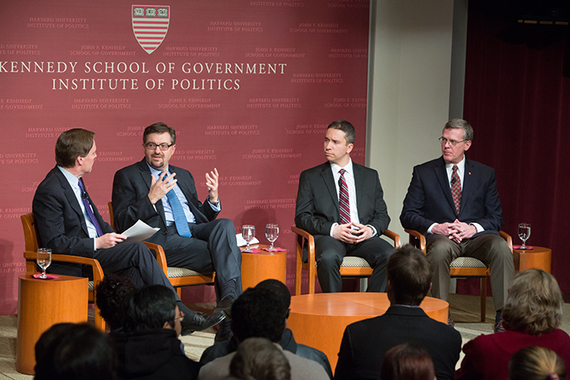
I was born in 1994, which may seem like an insignificant and almost self-important factoid with which to begin. Yet undoubtedly, I have never lived in a time when Europe was not relatively democratic, united and peaceful. So as the crisis in Ukraine unfolds and is described as the most important and dangerous moment for Europe since the end of the Cold War, I regretfully only have a vague conception of what that might actually entail. My experience with the Cold War lays grounded in text and history, the defining tension of the twentieth century like a memory you retain because you had heard a story again and again but do not feel your muscles move in action or the scenes flash before your eyes.
However, after I attended an event titled, "Crisis in Ukraine: How Should U.S. and Europe Respond?" at the John F. Kennedy Jr. Forum in the Institute of Politics, I became exposed to the nuances of the situation and heard from experts who even participated in the United Nations' meeting on Russian President Putin's invasion of Crimea.
Moderator R. Nicholas Burns challenged the panelists to focus on three questions: what is happening, what is Putin likely to do, and how should we respond to it? Harvard University Professor of Ukrainian History, Serhii Plokhii, provided contextual background of Russia's and Ukraine's relationship, noting that Russians, Ukrainians, and Belarusians are all derived from the same medieval state, Kievan Rus.
Until the seventeenth century, Ukraine was a part of political bodies other than Russia, but then Russia began its movement westward, incorporating the area around Kiev. Three hundred years later, in celebration of the Russian takeover of Ukrainian territory, First Secretary Khrushchev ironically negotiated for Crimea, a geographically critical island peninsula, to be transferred to Ukraine.
According to Plokhii, Putin believes that Russians and Ukrainians are of the same people. While the ethnic composition of Ukraine is 60 percent ethnic Russian, 25 percent Ukrainian, and the rest Tatars and other nationalities, I personally do not consider it the right of Putin to equate language with identity and ethnicity and "to protect Russian speakers," as he says, who are patriotically Ukrainian.
Stanton Nuclear Security Postdoctoral Fellow Eugene B. Kogan then elaborated on the simultaneously strategic and domestic objective of Putin to invade Crimea. In Kogan's view, Russia cannot lose Ukraine to the West without a fight, especially with Ukraine in its current state where banditry can take over.
All three panelists agreed that Putin will likely continue the Russian presence in Crimea, with Plokhii adding that there will potentially be a referendum and creation of Crimean statehood. They all also agreed that Obama made the right call by avoiding military action and that a combination of supporting Ukraine, meeting with NATO to reaffirm defense of current members, and imposing an economic cost to Russia, such as heavy sanctions, boycotting the G8 summit, or expelling Russia from the G8, would be the ideal response.
Kevin Ryan, Belfer Center Director of Defense and Intelligence Projects, said that the biggest challenge is how to balance and deter Russia, and Kogan added that the Ukraine crisis will define Obama's presidency for the next several years in the same way that the Cuban Missile crisis defined Kennedy's.
In the end, the Crisis in Ukraine Forum put the situation in a historical, economic, and political context found nowhere except at Harvard's Institute of Politics. I could hear the eerie echoes of the Cold War, resurrecting the darkest days of the twentieth century, especially in how Putin justifies his action as legitimate force from a strong leader and strong person.
I hope that this crisis about the Ukrainian government and people and the Russian government and people can remain without a shot fired, but like Ryan said, it unfortunately is a tinderbox with a lot of matches standing up that can be lit any moment. I can only wish that with a common front, that explosiveness can be maintained by the international community.